Once you have decided that Steiner Education is right for your family, you will start to field a great number of questions, not least of which is in regards to TV, media and technology use for children.
The most prevalent (and contentious!) topic of conversation surrounding Steiner education, without a doubt, is the restriction of TV and media in the home and classroom.
Even if you are only just at the very, very beginning of your path toward investigating Steiner Education for your child, you will already undoubtably be aware that media use of any kind is strongly discouraged until adolescence within the Waldorf framework, and even then only in small, well selected doses. This extends to computer/device/tablet use of any kind, to the extent that computers themselves are not introduced into the classroom until the students are in…wait for it…HIGH SCHOOL (gasp! 😉 ).

This approach is so counter to the current accepted norm that many of those who have not read much about Steiner educational philosophy (well meaning grandparents, family friends with young children themselves, etc) regard these concepts occasionally with suspicion, dubiousness and skepticism. In my experience at least, there will be many opportunities to explain “why” things are done this way in the Steiner classroom, and why most parents sending their children to these schools often make dramatic lifestyle changes to align with these beliefs. Below I will share our unique “why”.
A home without TV?
So, we don’t own a TV. We gave it away a year and a half ago and haven’t looked back. This in and of itself can be alarming and baffling to some.
‘But how do you pass your time?…How do you stay in touch with current affairs and the outside world?… What’s so bad about TV anyway?…What about programmes that are educational? There’s nothing wrong with them for the children, surely?’
Sometimes, unfortunately, there can be a certain defensiveness that accompanies this line of questioning; a subconscious need, perhaps, to defend their own choice of sharing television and media with their own family. If you are walking the path less chosen you will undoubtably be asked to justify yourself and will occasionally encounter some who will be offended that you have rejected what they themselves have embraced. This is just part of the cost of living life with the privilege of free choice, and using that free choice independent of the majority.
If you are on the brink of making the change of getting rid of your television, or shutting it off more often, you might have your own secret worries and be wondering the same things asked above. I think there is real value in honesty surrounding these questions. Let me assure you: life without a TV and with reduced media exposure can actually be pretty awesome.
So, let’s look at these questions, shall we?
How do you pass your time?
Honestly, I have no idea how we fit in watching TV before we got rid of the thing. The first challenge I suppose was re-directing Master C’s focus without having television to fall back on during times of adult need (such as meal preparation time, when you need 5 minutes to take a private phone call, or during baby’s nap time). I will admit, this is still challenging sometimes.
The solution is creativity and to embrace the kids’ presence in whatever way you can without losing your mind.
Almost all of the Waldorf blogs and books I have read about life with children paint a very beautiful and magical picture of what it looks like to be at home fulltime caring for young children. Some days that beauty and magic is harder to find than others – there ARE days when everything is just…messy, hectic and difficult. Embracing the children’s presence without the fall back of the television can be hard, especially when dinner should have been started half an hour ago, your toddler keeps trying to climb into the dishwasher, your 4 year old has just brought a bucket of sand inside and dumped it on the floor, and the neighbour has chosen this moment to knock at the front door for a chat. Believe me, there have been moments where I have questioned whether perhaps I am insane to have gotten rid of our TV. But.
We found the best way to manage these challenges was to try as much as possible to include the kids in whatever we are doing. So, instead of turning on the telly when its time to make dinner, I lay out two small chopping boards and two Kiddie Kutters and give the boys each a veggie to cut. Big Daddy whipped up this amazing contraption, inspired by a product called the Little Helper Fun Pod.
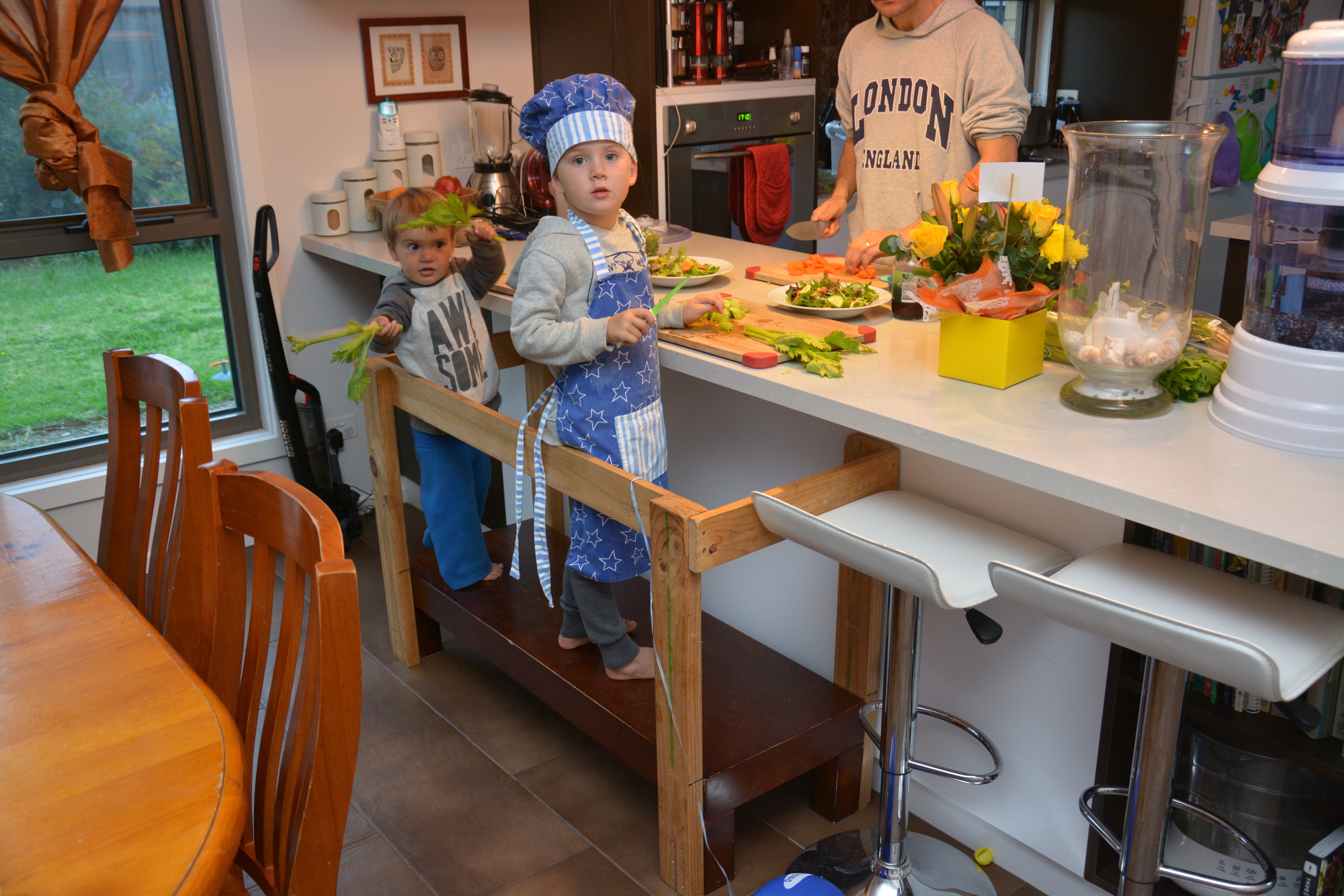
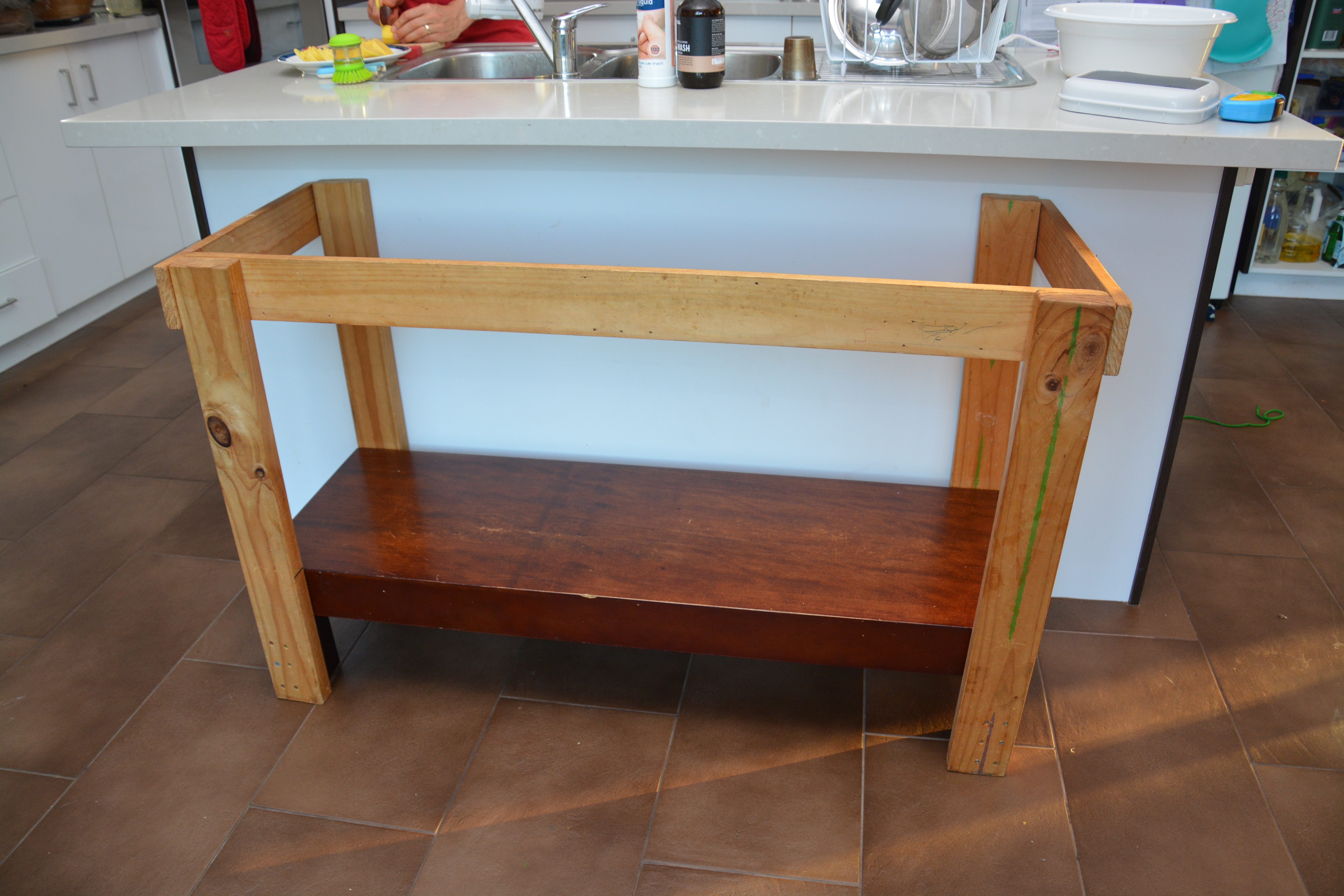
We loved the concept of the FunPod but didn’t have the funds to shell out for one, let alone two! Our version is not terribly pretty, but I’ll tell you what, that thing gets more use than pretty much anything else in the house. It’s made from a repurposed bench with legs shortened. It cost us nothing, as we had the spare timber laying around from previous projects. I really recommend having something like this on hand if your kids are young and you are thinking to ditch the TV, if your home is anything like mine at dinnertime. I did use the ol’ kitchen chair before we had this, but Master C fell off more than once. It was worth the effort to bang this one together.
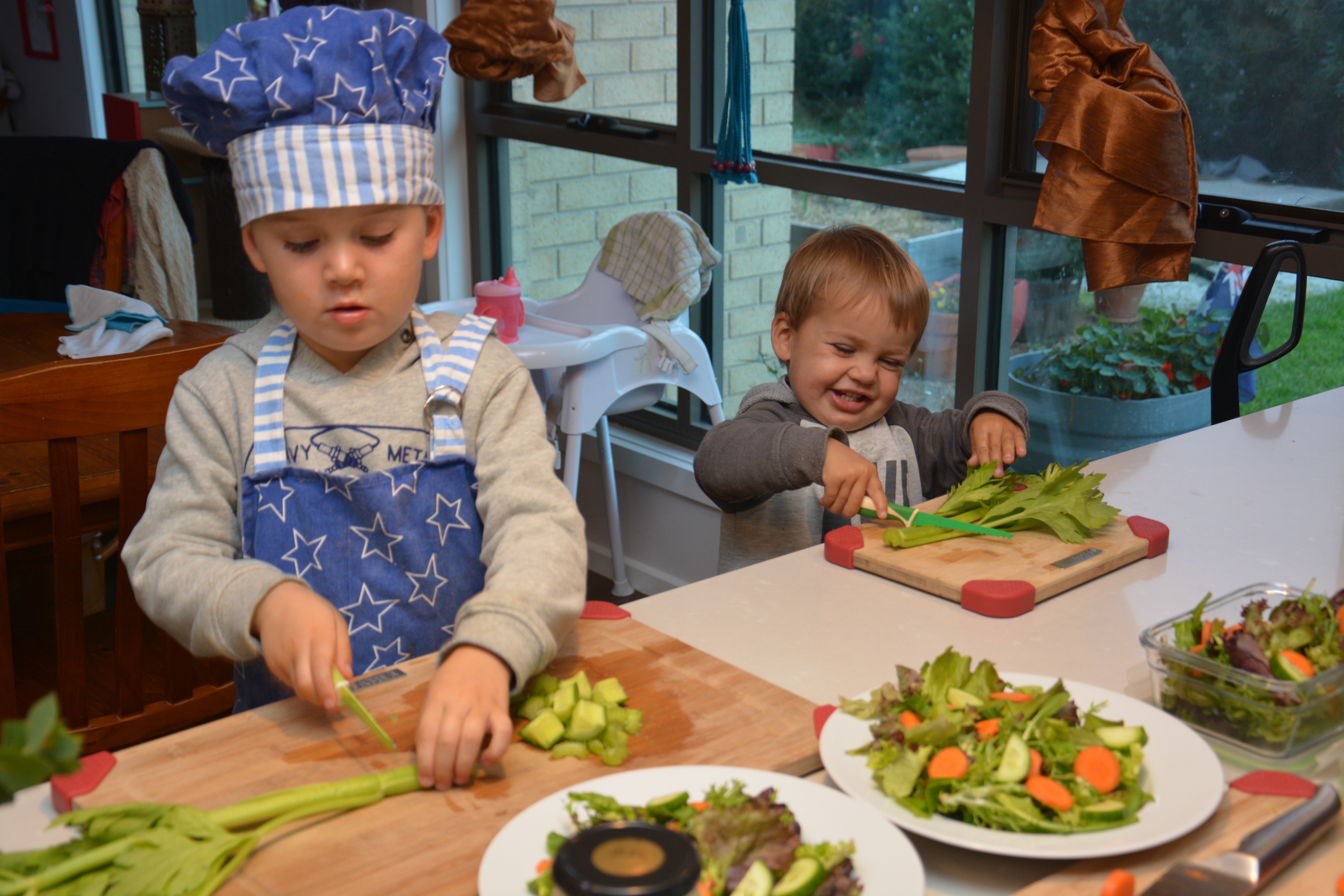
For those other times of day where I might have previously been tempted to turn on the TV to occupy the kids, such as when a younger child needs to be put down to sleep and you need quiet from any older children, I have had to be creative. Having a few toys stashed away for “Baby’s nap time only” can be invaluable. We have used lego, playdough, lacing beads, specific books in a rotation or leaving out a small craft or activity that your toddler or preschooler can work on without supervision (check out these Busy Bags for some great inspiration too!).
How do you stay in touch with current affairs and the outside world?
While we do not own a TV any longer, we have not severed our media use entirely, or else how on earth would I be able to write this blog? 😉
The internet can be a wonderful tool and it is undoubtably an excellent means of staying in contact with the greater world out there. I have had no difficulty in keeping abreast of global happenings, local concerns or cultural trends given that I DO access the internet daily through my iPad or phone. However, our kids do not use our iPads or phones, and as parents we do try to maintain a degree of separation from our devices during the kids’ waking hours.
My ideals tell me to fight back against what appears to have become the new social norm, where children are accustomed to their parents spending a large part of their day looking down at phones or devices; a million miles away from a moment that will one day surely be missed.
Creating appropriate boundaries around device use in our home is an on-going evolution and we are still finding our happy medium.
What’s so bad about TV anyhow?
Everyone who has walked away from TV will perhaps have a different answer to this complicated question. Our answer began with the kind of childhood experience we were seeking to provide for our children which simply did not include screen time; but there is another level for my husband and I, as adults, that has to do with how mainstream TV programming affects (and, no doubt about it, manipulates) society as a whole that we also rejected, and I address this further down. But let’s start with the effect of television on children.
There is a reason the Australian government (and many others) recommend that children under the age of 2 are not exposed to television at all, which is not limited to concerns related to content but also, just as importantly, the way in which television consumption affects a child neurologically.
This little snippet from the Healthy Children website sums it up nicely (full article here):
‘Good evidence suggests that screen viewing before age 2 has lasting negative effects on children’s language development, reading skills, and short-term memory. It also contributes to problems with sleep and attention. If “you are what you eat,” then the brain is what it experiences, and video entertainment is like mental junk food for babies and toddlers.’
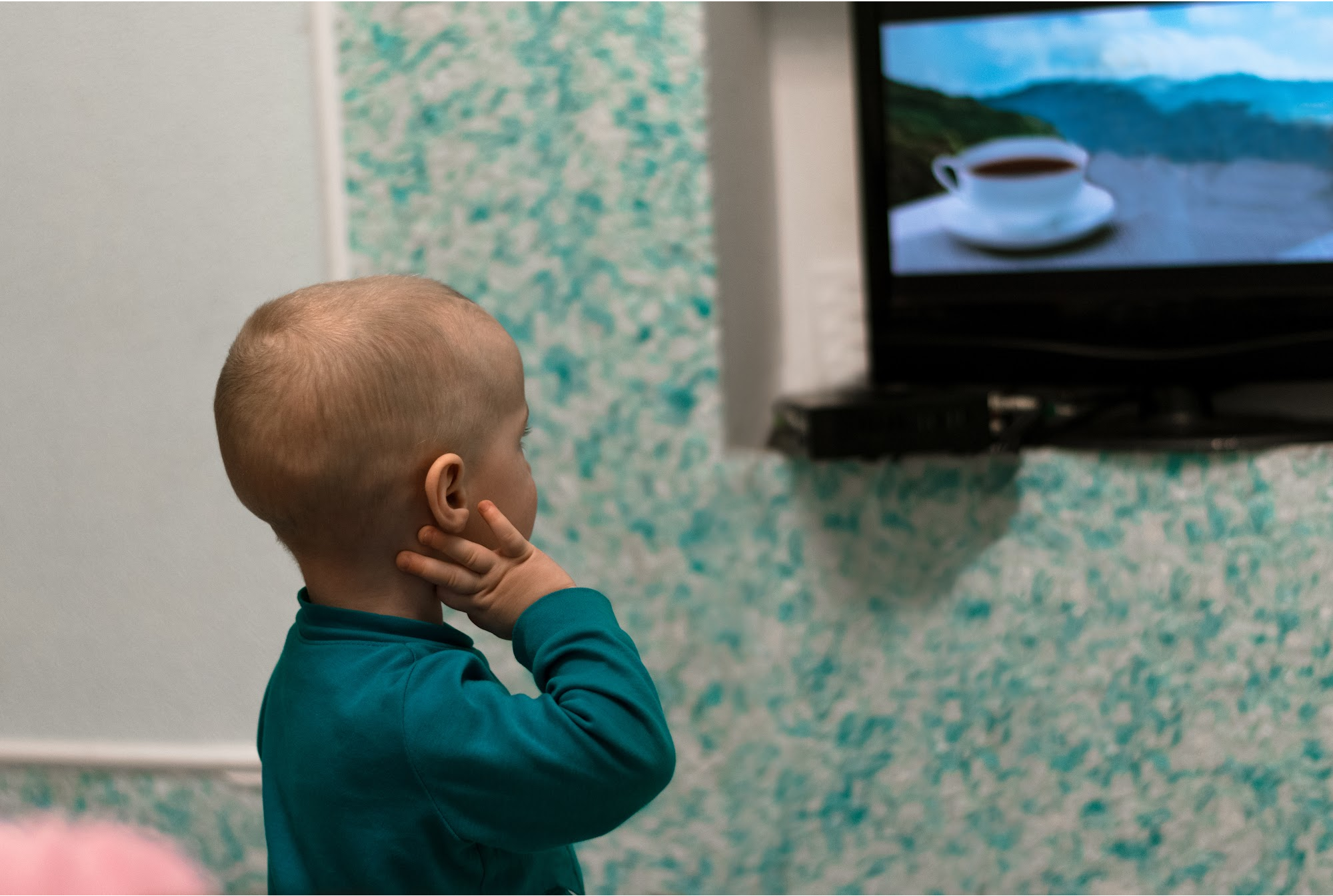 Photo credit: Shutterstock
Photo credit: Shutterstock
Beyond the age of 2, the use of TV and other technologies by young children has now become an accepted societal norm, despite the fact that there are very real and concerning implications of this. You’ll see it in cafes, restaurants, on the train, even the dentist’s chair. It is a reality of our modern life and, to some extent, there is no avoiding its eventual creep into the home as our children grow. However, when the kids are quite young still, there is so much value is keeping it switched off as much as possible.
Taken from the recent HuffPost article The Impact of Technology on the Developing Child:
‘Children now rely on technology for the majority of their play, grossly limiting challenges to their creativity and imaginations, as well as limiting necessary challenges to their bodies to achieve optimal sensory and motor development.’
Steiner philosophy views the young child as a ‘sense organ’; existing entirely in a heightened state of sensory perception, with little ability to filter or shield themselves from the norm of our over-stimulating society and its technologies.
Children who are exposed to television/video games or screen time of any sort at too young of an age, and/or in great quantity, are affected not only by the content of what they are watching (or subconsciously exposed to, if a TV is constantly on in the background, which comprises a whopping 50% of American households), but also by the rapid shifts from shot to shot that is characteristic of today’s in-your-face, faster-brighter-harder entertainment model.
Children’s television programming in the 70’s and 80’s á la Mr Rogers and his contemporaries typically involved cinematic styling known as tracking shots, where the camera follows the action for an extended period of time in one single continuous shot, without splicing from image to image. A typical shot may well have lasted for a full minute or longer. Today, even in television material that is supposedly educational and directed at the youngest of children (“Baby Einstein” videos, for example), there is such an inappropriate amount of overstimulation that the camera cuts away to a new disjointed image every 3 seconds on average. Prolonged exposure to rapid image change such as this preconditions the mind to expect high levels of output, which leads to inattention in later life, and can be obviously quite damaging to a young child’s developing mind and potential for creative engagement down the line. For more information on this, have a look at this fantastic TED talk that delves into how TV affects the brains of children, delivered by highly regarded paediatrician and researcher Dimitri Christakis.
What about programmes that are educational? There’s nothing wrong with them for children, surely?
First, you have to look at the age of the child. If your child is under the age of 2, then no progamme whatsoever can provide any kind of educational value that outweighs the potential harm of premature media exposure, as described above. Even the majority of so-called educational programming is rife with rapid sequencing, disjointed imagery and confusing narrative. The perceived benefit does not outweigh the risk. Secondly, any value that purported educational programmes or video games offer has to be considered relative to what is available in the child’s own environment. Children will learn best through direct experience with an object, concept or event and no amount of watching something educational on a screen can be superior to that. While not all families will be willing or able to provide children with direct opportunities for learning, this does not mean that those who are should see marketed ‘educational’ programmes as holding any value whatsoever.
Going to the fire station to see the fire trucks, visiting a farm to see a cow being milked or watching the planes taking off at the airport (and the discussions with parents that result from these visits), as well as good, old-fashioned digging holes in the dirt, are true experiential activities that a child can learn from, and will teach them far more than watching these same events on TV. If a child is genuinely moved to learn move from these excursions, the library can provide books that will enhance that experience.

All that being said, I personally feel that there can be some value in the very occasional educational program (provided it is genuinely educational and not just marketed as such), but ideally this would be delayed until the child has transitioned from the dreamy physical realm of early childhood and is now awakened into the intellectual realm, as Steiner sees it (around age 7 and up). Admittedly, a trip to the fire station cannot quite paint the picture of what a fireman actually does to fight a true fire, and sometimes as parents we might not be able to take our children into all the places a documentary film camera can (such as behind-the-scenes in an airport). In these cases, as a once-in-a-while thing, allowing the older child to view some episodes of Mighty Machines or other slow-paced documentary-style educational programming can offer some benefit. This is just my opinion and it is actually contrary to what is advocated by more conservative Steiner families and educators generally. I have found personally that there is still a great range of opinion on the topic even within the Steiner community. Finding your own grey areas within a no or low-media home will be a unique journey only your own family can take.
So, seriously, do your kids watch no TV at all?
Okay, well, no. As much as I am aware of all of the above, we are not all that militant about our kids being exposed to SOME telly (providing it is age appropriate), because, well, we’re just kind of laid back like that. The kids do watch some telly when they go to visit their grandparents and their cousin, and we don’t have a problem with that, as these visits total no more than a handful of times a year.
Additionally, and call me a hypocrite if you will, I admit that when things have been very hard for me on a particular day at home with the boys, I will allow Master C to watch his one and only movie on my iPad while Little Man J has his nap (The Winnie the Pooh Movie, which is very tame, slow paced and sweet). He probably watches his movie maybe once every month or two. Aside from occasional video calls on Skype to family back in Canada, this is the only time Master C is allowed to use my iPad. We feel comfortable with what little exposure to media our kids have presently, and of course getting that balance right for your own family looks different for everyone, and indeed may well depend on the age of your child.
Why the adults turned off the TV
Once we decided to turn off the telly for the kids, it didn’t take us long to realise that we, the adults, didn’t need or want it either. We were aware of the fact that programming generally– particularly that geared toward mature audiences–presents a picture of the world that we do not share and encourages values and priorities that we felt were far removed from those we held to be true in our hearts. Since saying farewell to our television set a year and a half ago, my husband and I enjoy a deeper personal connection; we have re-enlivened our mutual interest in learning and reading; and we also have more time for creative projects both shared and independent.
That being said, we do very occasionally watch a movie here and there on the laptop, downloaded online. Not coincidentally, since getting rid of the television, we have become a lot more interested in learning stuff and consequently much of what we have watched together in the past year has been documentary style. I don’t think it is coincidence that this kind of curiosity begins to present itself once the distraction of mainstream television programming was removed from our reality. It has been a very educational and fascinating year-and-a-half full of unprecedented personal growth, and there is no going back now.
Well, there you have it. If you are looking for more reading on the matter, I recommend this entertaining and informative post from OpenWaldorf.com on the topic of Media Restriction at Waldorf.
I’d love to hear your feedback! Drop me a line below and let me know where you are at in your journey.
With love and light,
Robyn
xx

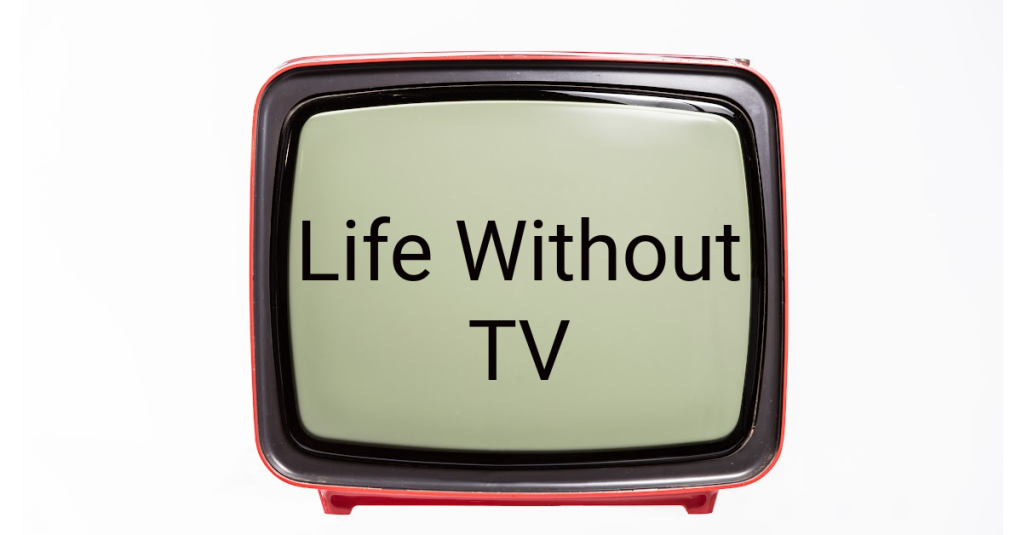
Leave a comment